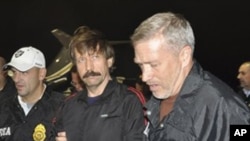Alleged Russian arms dealer Viktor Bout makes a second appearance in a New York court Friday, where he is accused of offering to supply arms to terrorists and rebels in Africa. Oxfam, an International non-governmental organization fighting poverty and injustice, says the Bout case shows why there is an urgent need for global rules on arms trade.
The charges against Viktor Bout stem from a 2008 U.S. sting operation in which authorities say Bout tried to sell weapons to agents posing as representatives of the Colombian FARC rebels, a U.S.-designated terrorist group.
But Oxfam spokesman Louis Belanger says Bout had been operating for decades as an arms dealer and was notorious for supplying arms to African countries in the middle of brutal civil wars, including Angola, Liberia, Sierra Leone and Sudan, among others.
"You're talking about weapons that ended up in the hands of militias and human rights violators. He did this basically just because the void in international law when it comes to trading arms. There are no global rules as of today to regulate arms trade," he said.
Belanger says Bout was able to operate in a legal vacuum in countries that either had weak or no rules governing weapons sales.
“The main point is that there are dozens of arms dealers still operating today, free of legislation, free of international law on arms trade. And that's what we need to tackle, we need to make sure there are strict laws on where and how you can sell your weapons,” he said.
According to Oxfam, only about 60 countries have laws pertaining to the trafficking of arms. Oxfam and other non-governmental organizations are campaigning for a global arms trade treaty that is currently under negotiations at the United Nations.
Daniel Prins heads the conventional arms branch of the U.N. Office of Disarmament Affairs and is working on that treaty. He said he expects a final agreement to be hammered out by 2012.
Prins says one of the lessons that can be learned from the Viktor Bout trial is that international cooperation is key to regulating arms trade.
“The international arms trade is a highly globalized business, where you can set up your business in country A, but your bank account in country B. And the goods that your transferring go from country C to country D through country E. But all these countries need to have legislation in place, need to agree with each other where the arms trader actually needs to find a license for his activities,” he said.
Prins says he has no illusions that all illegal arms trade will cease after a treaty is concluded. He foresees the treaty becoming a tool for countries to work together and also improve their own legislation to counter the work of illegal arms traders.
Russian Arms Dealer's Trial Resumes Amid Calls for Global Arms Treaty






